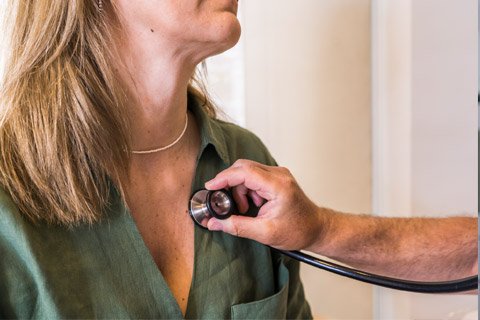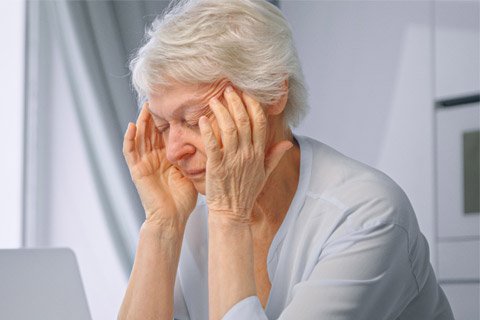Like many other diseases and health conditions, heart problems can become more common with increasing age, affecting people’s day-to-day routine and quality of life. While it’s natural for the ageing process to bring certain changes to our cardiovascular system, factors like genetics and lifestyle choices can significantly influence the development and progression of heart diseases.
In this article, we look at common heart problems in elderly people, some of the common symptoms they can cause and explore some of the tips and lifestyle changes that may lower the risk of developing a heart condition in later life.
Jump to:
- High blood pressure
- Coronary artery disease
- Heart valve problems in elderly
- Heart failure
- Preventing heart conditions in elderly
1. High blood pressure
High blood pressure, also known as hypertension, is essentially when the force of your blood pushing against your artery walls is consistently too high, and it is a common concern among elderly people as well as younger adults.
In fact, around one in three adults in the UK suffers from high blood pressure, with the first signs often appearing as early as in the early thirties.
Causes of high blood pressure
So, what is the main cause behind high blood pressure? As we age, our blood vessels tend to lose their flexibility and become less elastic, which can lead to increased blood pressure. High blood pressure is usually measured by a reading of 140/90mmHg or above, but if you have other health conditions, this can sometimes mean that lower readings might be considered high. Blood pressure is usually tested with an arm cuff and gauge.
Lifestyle factors such as having a poor diet, being overweight, lack of exercise or stress can have a big impact on this condition. For instance, foods high in sugar or saturated fats can increase your blood pressure and cause heart damage over time. Similarly, salty foods, like processed meats or canned soups, can contain an excessive amount of sodium, causing your body to retain more fluids and raising your blood volume and pressure.

Symptoms of blood pressure
One of the dangerous facts about high blood pressure is that it often goes unnoticed and doesn’t present any obvious symptoms, earning the nickname “silent killer”. Therefore, regularly measuring blood pressure is the only reliable way to detect any issues and take proactive steps to manage the condition effectively.
Very high pressure can, however, cause symptoms including:
- Dizziness
- Fatigue
- Nosebleed
- Headache
- Nausea
- Blurred vision
- Breathlessness
- Chest pain
When it comes to hypertension, it's important to remember that when it's not regulated by lifestyle changes and medication, it can lead to serious, life-threatening health risks including heart attacks, strokes or heart failure.
You can also read our blog on Common elderly blood pressure issues to learn more about blood pressure fluctuations and its management.
2. Coronary artery disease
Coronary artery disease (CAD), sometimes called coronary heart disease, is another common heart condition among the elderly, characterised by the narrowing or blockage of coronary arteries that supply blood to the heart muscle.
Causes of coronary artery disease
In simple terms, different substances, such as cholesterol or calcium, can start accumulating around the inner walls of the arteries, causing a build up that can limit or block the blood flow to the heart and other parts of the body. This process is also known as atherosclerosis, as the arteries become thicker in the walls but narrower inside.
The factors leading to coronary artery disease are very similar to the ones related to high blood pressure and can include being overweight, having an unhealthy diet, drinking alcohol, smoking and physical inactivity.
In fact, it’s very common for CAD to develop as a result of persistent high blood pressure, especially when coupled with other risk factors such as elevated cholesterol levels, diabetes, and obesity.
Symptoms of coronary artery disease
Unlike high blood pressure, coronary artery disease can cause more severe symptoms, including:
- Chest pain (also known as angina)
- Shortness of breath
- Weakness, light-headiness and nausea
- Pain or discomfort in the arms or shoulder
However, the symptoms may differ for everyone, and the first signs of coronary artery disease might not always be as obvious. Therefore, especially with increasing age, prevention and regular medical check-ups, such as pressure monitoring, cholesterol screenings, and cardiac assessments, become the key to reducing the risks of serious health hazards.

3. Heart valve problems in elderly
Heart valves are important parts of the heart, regulating the flow of blood within the heart chambers. Essentially, heart valves act like gates, making sure the blood passes forward and doesn’t flow back.
For people of an advanced age, it is common for the valves to stop functioning properly due to wear and tear over time. However, heart valve problems in the elderly can be also linked to other health conditions, such as an infection, increased cholesterol, high blood pressure or coronary artery disease.
There are several different types of valve issues, with the most common ones including:
Aortic stenosis
- Aortic stenosis is the most common heart valve problem in the elderly, with the valves becoming stiff and too narrow to allow the heart to pump the blood efficiently around the body.
Aortic regurgitation
- Aortic regurgitation is another common heart valve condition, causing the blood to leak backwards as the valves fail to close tightly.
Symptoms of heart valve problems in elderly
The symptoms of heart valve problems usually depend on the cause of the condition, but some of the common ones can include:
- Shortness of breath
- Palpitations caused by irregular heartbeats
- Dizziness
- Fatigue
- Chest pain
- Leg swelling
- Low exercise endurance
While symptoms like fatigue or dizziness can indicate a range of different health conditions, it’s always important to seek medical advice to prevent serious health risks. Especially in the elderly, the symptoms can get worse over a short period of time and threaten people’s lives.
4. Heart failure
Heart failure, also known as congestive heart failure, is a serious condition where the heart becomes weakened and unable to pump blood efficiently throughout the body. It doesn’t mean the heart stops working completely, but it needs support to work properly.
While heart failure can occur at any age, it is generally more common in elderly people. Additionally, other conditions mentioned above, including high blood pressure, coronary artery disease and valve problems, can gradually lead to heart failure, as they weaken the heart and its ability to fill and pump blood properly.

Early signs of heart failure in adults
Early signs of heart failure in adults can be subtle and often go unnoticed. However, it's important to be aware of potential indicators that could signal a problem with the heart, such as:
- Persistent fatigue
- Shortness of breath, even when not doing any physical activity
- Swelling in legs, ankles and feet
- Rapid or irregular heartbeat
- Persistent coughing and wheezing
- Sudden weight gain due to fluid retention
- Nausea and lack of appetite
- Difficulty concentrating
Like many other cardiovascular diseases, heart failure can be life-threatening, and it’s crucial to seek medical help if experiencing any of these symptoms. Early diagnosis, proper treatment and lifestyle changes can reduce the symptoms of heart failure and improve quality of life.
5. Preventing heart conditions in elderly
While ageing is a natural process that can bring changes to the cardiovascular system, there are proactive measures older adults can take to reduce their risk of developing heart conditions.

Adopting a heart-healthy diet
- As we’ve already mentioned, a healthy diet can be really important for cardiovascular health. Encouraging a diet rich in fruits, vegetables, whole grains, lean proteins, and healthy fats can help manage weight and lower cholesterol levels.
- Equally, limiting the intake of processed foods, saturated fats and sugars can help manage blood pressure levels and reduce the strain on the cardiovascular system.
- If you’re looking for inspiration to embrace a healthier diet, you can read our Ultimate guide to meal prepping for older adults, or check our blog on Healthy snacks for elderly people.
Staying physically active
- Regular exercise is crucial for maintaining heart health and overall fitness, with activities like walking, swimming and yoga being particularly beneficial for heart health. Take a look at our articles on having an active and healthy lifestyle in later life.
Managing stress
- Chronic stress can impact various areas of our health, including the cardiovascular system. Alongside practising stress-relieving activities, such as yoga and meditation, it’s really important for the elderly to engage in hobbies that help manage stress, promote relaxation and lower the risk of heart problems developing.
Quitting smoking
- Smoking is a significant risk factor for heart diseases, including coronary artery disease and heart attacks. Encouraging older adults to quit smoking and providing them with supportive resources can reduce the risk of heart diseases and prolong their life.
Monitoring blood pressure and cholesterol
- Regular blood pressure and cholesterol checks become essential, especially in elderly, as they can help detect the first signs of common heart problems.
Maintaining regular medical check-ups
- Alongside monitoring blood pressure and cholesterol, it’s important to encourage older adults to schedule regular health checks to get a comprehensive assessment of their heart health. Those with no existing health conditions are invited to have an NHS health check every five years, but older people that already have some health concerns may need to be checked more regularly as part of their treatment and management plan.
Peace of mind for older adults and loved ones
Heart conditions can pose a significant risk to the elderly population and can greatly impact their quality of life. However, by adopting healthy lifestyle habits, scheduling regular medical check ups and managing risk factors can reduce the chances of developing a heart condition.
Whether your elderly loved ones suffer from a heart condition, or you’re simply worried about their safety at home, getting a personal alarm can be a good solution to give you peace of mind. In the form of a pendant around the neck or wrist, this alarm device is connected to a 24/7 Emergency Resolution Team, allowing the elderly to call for help when they fall, feel unwell or have another emergency.






